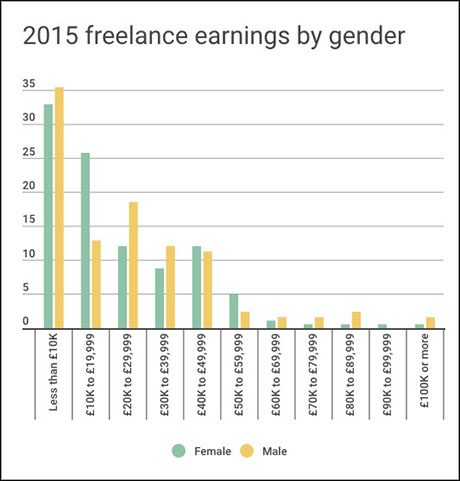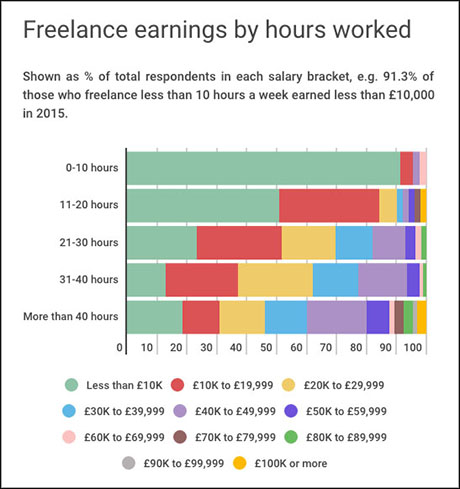A third of freelance journalists earned less than £10,000 from their work last year, according to a Journalism.co.uk survey.
At a time when the gig economy is said to be booming, the survey aimed to shed a little more light on an industry to which many journalists will turn at some point in their careers.
Between May and July 2016, 310 people submitted responses. The survey is far from perfect – our sample size is relatively small, for example, meaning we didn't correlate enough information to delve into issues such as race and ethnicity.
However, it's a step in the right direction toward understanding the realities of freelance life.
About our sample
More than two thirds (69.7 per cent) of those who responded to the survey said freelance journalism was their sole or primary source of income.
Just over 40 per cent of freelancers who responded to our survey fell into the millenial (18 to 34-year-old) age bracket, and a third were 35 to 44 years old (although this may say more about the demographic of our readers than it does about freelancing in general).
Almost 75 per cent of respondents were living in the UK, 9.7 per cent in Europe, and 8.4 per cent in the US. We also had a few responses from Asia, Australia, South America, and Africa.
However, what proved to be internationally universal were freelancers' concerns about job instability and low income.
How much?
"It's becoming increasingly viable only as a hobby, not a job that can pay realistic money," wrote one British freelancer.
The median UK salary for "journalists, newspaper and periodical editors" is £31,294, according to a 2015 review by the Office of National Statistics.
But just 10 per cent of those who responded to our survey said they earned between £30,000 to £39,000.
Around one in five (21 per cent) said they earned between £10,000 to £19,999, and 33.9 per cent said they earned less than £10,000.
This correlates with NUJ research published last year, in which more than half of freelance journalists said they had suffered financial hardship, and almost 90 per cent said their rates had not increased in the past year.
But it's not all bad news. Of those respondents who were freelancing prior to last year, more than a third (35.8 per cent) said they earned more in 2015 compared to previous years.
Only 1 per cent said they made a six-figure income from freelancing – and they worked in finance, B2B, and television.

The gender gap
Of the 306 respondents who gave their gender identity, just under 60 per cent were female, which corresponds with industry data suggesting that freelancing is a female-dominant profession.
This goes against the grain of standard newsroom demographics where, according to the latest annual diversity survey by the American Society of News Editors, 62.9 per cent of editorial staff are men.
Despite this, it seems women are still earning less than men when it comes to freelancing.
The median freelance income of our male respondents in 2015 was £20,000 to £30,000, compared to £10,000 to £19,999 for women.
And although slightly more men than women told us they earned less than £10,000 last year, just over half also said they generated £20,000 or more, compared to 41.2 per cent of women in that salary range.
Unfortunately, this is nothing new. Figures published by HM Revenue & Customs in 2014 revealed self-employed women earned 40 per cent less than self-employed men.
However, in the top salary brackets the gap appears to narrow, with 9.7 per cent of men and 8.2 per cent of women saying they earned £50,000 or more from their freelance work last year.

Freedom, flexibility, and falling rates
Despite anxieties about job insecurity and low, often irregular, income, many people who responded to our survey were enthusiastic about the flexibility and autonomy of being your own boss.
"It's more hours than I'd do in a full-time salaried job, for sure," wrote UK-based freelancer Mike Jennings, "but I can pick and choose the hours to fit around the rest of my life."
Some relished the opportunity to spend more time with their young children, while others were equally happy about sidestepping the daily commute and office politics or, as one response put it: "No control freaks or bullies in my life".
The freedom to choose how much work to take on was another benefit which cropped up a lot, with one person saying they chose not to work full-time throughout the year to allow time to pursue "personal – unpaid – projects, or travel".
However, many respondents expressed strong concerns about falling rates, lack of pensions or holiday and sick pay, and the loneliness of working so much alone.
"It's really difficult to take holidays," wrote a woman called Sarah. "There is the constant fear that next month I might not get any work."
Several freelancers noted they had been asked to work for free, while others felt they were not progressing in their careers without the training and opportunities for promotion that often accompany a staff job.
Regular work was also a problem for many. As one response noted: "Editors will use you tons one minute and then ignore your pitches for months the next. You lack the gravitas to get big projects going that you know would work if you were inside a publication."
Side gigs: from sub-editing to stripping
Of the 30.3 per cent or respondents who said freelance journalism was a side gig rather than their primary or sole source of income, the most common "main" jobs were teaching, copy editing, PR, and consulting.
However, some were also full or part-time staff journalists, perhaps looking to earn extra money or provide a safety net for themselves in case of redundancy.
Freelancers must be good all-rounders, as one person noted: "Actually, writing represents a diminishing proportion of my income... I earn more doing routine subbing, editing, proofing, and project management work which makes little or no demand on the specialist knowledge I've acquired in my niche."
And for some respondents, their primary income source wasn't journalism-related at all.
One person struggling to make ends meet said he was working "in a corner shop to pay my rent", while another said she earned money through "nutrition consultations, and I also strip (yes, really)".
Qualifications vs. experience
The debate around whether you need a journalism degree to be a journalist shows no sign of burning out anytime soon, although qualifications do not seem to have much of an effect on freelance earnings if our survey if anything to go by.
Just over half (55.8 per cent) of respondents had some form of journalism qualification.
However, last year's median earnings for both those with journalism credentials and those without was the same – £10,000 to £19,999.
On the other hand, our results seem to suggest that experience does matter.
Median earnings in 2015 for freelancers with less than 10 years' experience were £10,000 to £19,999, but this increased to £25,000 to £34,000 for those with 11 to 15 years under their belt.
The sweet spot seemed to be 16 to 20 years' experience, where the median freelance income was £30,000 to £39,999, after which earnings began to drop again.
More hours, more money?
A standard working week (or even just under) seemed to be most common for our respondents, with almost a third (29.7 per cent) saying they worked 31 to 40 hours a week.
More than a fifth (21 per cent) said they worked more than 40 hours a week.
Perhaps predictably, those who worked fewer hours earned less money, although almost one in five (18.5 per cent) of those working more than 40 hours a week also said they earned under £10,000 last year.
And 2 per cent of those who said they worked 11 to 20 hours a week also said they earned £100,000 or more last year. Wonder what their secret is?
A quarter of respondents working a 31 to 40 hour weeks earned £20,000 to £29,000 last year, while those who worked more than 40 hours a week were more likely to be earning in the £40,000 to £49,999 range.

Click here to view these results as an interactive chart.
Free daily newsletter
If you like our news and feature articles, you can sign up to receive our free daily (Mon-Fri) email newsletter (mobile friendly).
Related articles
- 'Give freelance journalists the due respect - and money - we deserve'
- Seven tips for using LinkedIn as a freelance journalist
- Three free AI-powered transcription tools for journalists
- Buzzfeed, Gal-dem, VICE…: What the closure of big digital media brands means for freelancers
- How The Bristol Cable is diversifying its freelancing opportunities










